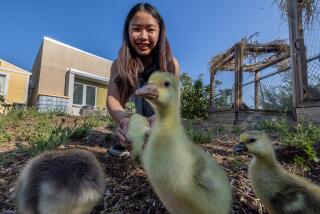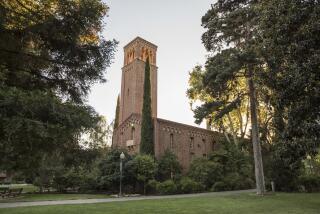Chicago High School Teaches About Farmers, Flowers and Career Opportunities : New Crop of Agriculturists Sprouts in Big City
- Share via
CHICAGO — It’s a high school with a livestock judging team, a field full of vegetables and a greenhouse full of flowers.
No football team. No cheerleaders.
In Chicago, of all places.
The Chicago High School for Agricultural Sciences opened four years ago on the southwest edge of this city of 3 million, the last stop before the suburbs and rural countryside. It is one of only two in the nation focusing on agriculture, and university recruiters lined up with scholarships for its first graduates this spring.
“If we can’t find students in the country, we’ll find them in the city,” says Roger Bruene of the Iowa State University College of Agriculture. “You don’t have to grow up on a farm to take advantage of these excellent career opportunities.”
“These ag companies are crying for people, especially minorities,” says horticulture teacher Ron Biondo. “We had 19 universities here a few weeks ago recruiting our kids.”
The first 86 graduates received their diplomas June 23 in a ceremony at the Chicago Board of Trade, where the nation’s major farm commodities are bought and sold.
The new school was welcomed by colleges of agriculture because their enrollments were declining at a time when there was a strong demand for people trained in agricultural sciences, food engineering, finance and marketing.
“This is a futuristic bridge between a metropolitan area and new job opportunities in the food and natural resource system,” says Allan Goecker of Purdue University.
Raised, Sold Crops
The graduating seniors raised and sold crops on the school’s 72-acre farm, spent weekends with farm families hundreds of miles away and worked afternoons and summers for major agribusiness companies.
“I knew I was interested in science and chemistry, but when I got here I really got excited about agriculture,” says Corie Yearby, who will study agronomy at Alcorn State University in Mississippi.
“I see all these career opportunities in agriculture and I want to be part of it,” said Theresa Garza, who will attend Lincoln University in Missouri and eventually hopes to grow crops in outer space.
The small high school reflects the racial balance of the city’s public school system--80% of its 435 students are black or Latino. They are recruited for their interest, not their grades.
“If Johnny can’t add two and two, you don’t say he can’t come here,” says Assistant Principal Kevin McCarthy. “You say to the parents, ‘Does Johnny want to come here and do you want him to come here?’ ”
Students face a tough academic program in the longest school day in Chicago and nearly 50% more class credits than other high schools.
But there is no shortage of applications. For every freshman accepted, another qualified student is turned away.
Parents and students are attracted because the school is relatively small and safe, and there is a likelihood of college and good jobs later.
“They learn about soil, landscaping and horticulture, and they use these skills,” says Gloria Yearby, Corie’s mother. “It gives them a real incentive to go on to college.”
The students have grown up in the city and for many, Biondo’s horticulture class is the first opportunity to have flower petals between their fingers and dirt under their nails.
In the greenhouse, sophomore Julie Berner watered and fertilized geraniums, some of the 50,000 bedding plants grown and sold by the students. The sale raised $7,000 for the school.
“Just listening to lectures in class would be boring, but this is exciting, hands-on experience in horticulture,” she says.
Outside, students fed the floppy-eared rabbits they raised and showed in competition. Janet Martinez, a junior, won first place with Buffy, her black Angora.
“I want to be a veterinarian and I know this is the right start--an agricultural high school,” she says.
Down the hall, the floral design lab was strewn with pieces of stems from the cutting table. There were cut flowers in a cooler, a diagram of plant parts on the wall, a chalk drawing of a celosia and young violets growing under lights.
Students sell their arrangements, including many that are used at official Board of Education activities.
“I had one girl with a learning disability who never had gotten good grades,” says Donna Theimer, who teaches floral design. “But, she loved this class, and now she has a career goal she can actually attain.”
In the computer laboratory, freshman Tracy Givens and classmates work on 34 terminals. Computer training is required.
“You just have a lot more opportunities here, a lot more responsibility,” says Givens, wearing a yellow shirt and cap advertising the Webberville, Mich., Corn Festival.
Visits with families in farm country give students a close look at production agriculture.
“It was a unique experience,” says senior Tracey Moore, who visited a Wisconsin farm. “I didn’t expect pigs to smell so strong. But the farmers are so friendly and they work very hard.”
Companies Participate
Principal Barbara Valerious says a key to the success of the high school has been the companies that provide specialized equipment for laboratories, guest speakers for classes and jobs for students.
Vicky Greer, a junior, spent last summer at Michigan State University working in the animal science department, helping with palatability tests on feed for steers.
Senior Jerome Offord works after classes at the Chicago Board of Trade, where he distributes literature to the public and helps organize seminars. Like the other students with ag-related jobs, he earns credit for high school and money for college.
“And, now I really understand how the markets work,” says Offord, who will attend Lincoln University to study agricultural education.
He is one of six students working at the Board of Trade, according to Lisa Foss, education and marketing coordinator.
One major agricultural company interested in the high school is Dow Chemical Co., of Midland, Mich., a manufacturer of farm chemicals and seed. Dow will provide four of the high school’s graduates with $2,500-a-year scholarships and summer jobs, says company spokesman Garry Hamlin. He said Dow wants them to be interested in careers in agriculture and with Dow.
“We recognize a shortage of strong research-and-development people in the field today,” Hamlin says.
At Purdue University, Goecker helped prepare a report for the U.S. Department of Agriculture on demand for graduates of agricultural colleges. He said the report concluded that the schools will turn out 44,000 students a year to fill 48,000 jobs.
“The bottom line is about a 10% shortfall in the late 1980s in terms of graduates,” Goecker says. “A lot of firms are in the marketplace, aggressively trying to hire people.”
Hamlin says, for example, Dow would pay an agricultural researcher with a bachelor of science degree between $24,000 and $29,000 a year to start and would pay up to $38,000 for someone with a doctorate.
“We are having trouble getting qualified people into biotechnology research,” says Jim Altemus of the Monsanto Agricultural Co., a St. Louis-based chemical manufacturer. “These are support people who have an exposure to science, biology, chemistry, math, and are patient, accurate and understand the metric system.”
Goecker says enrollment in colleges of agriculture peaked at 100,000 in 1976-77, then fell to a low of about 66,000 in 1987.
More to Read
Sign up for Essential California
The most important California stories and recommendations in your inbox every morning.
You may occasionally receive promotional content from the Los Angeles Times.













